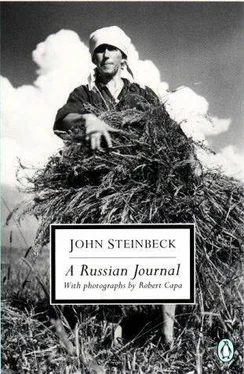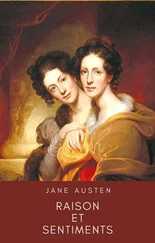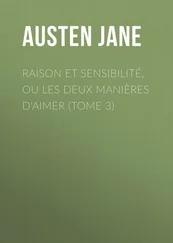John Steinbeck - A Russian Journal
Здесь есть возможность читать онлайн «John Steinbeck - A Russian Journal» весь текст электронной книги совершенно бесплатно (целиком полную версию без сокращений). В некоторых случаях можно слушать аудио, скачать через торрент в формате fb2 и присутствует краткое содержание. Жанр: Классическая проза, на английском языке. Описание произведения, (предисловие) а так же отзывы посетителей доступны на портале библиотеки ЛибКат.
- Название:A Russian Journal
- Автор:
- Жанр:
- Год:неизвестен
- ISBN:нет данных
- Рейтинг книги:4 / 5. Голосов: 1
-
Избранное:Добавить в избранное
- Отзывы:
-
Ваша оценка:
- 80
- 1
- 2
- 3
- 4
- 5
A Russian Journal: краткое содержание, описание и аннотация
Предлагаем к чтению аннотацию, описание, краткое содержание или предисловие (зависит от того, что написал сам автор книги «A Russian Journal»). Если вы не нашли необходимую информацию о книге — напишите в комментариях, мы постараемся отыскать её.
A Russian Journal — читать онлайн бесплатно полную книгу (весь текст) целиком
Ниже представлен текст книги, разбитый по страницам. Система сохранения места последней прочитанной страницы, позволяет с удобством читать онлайн бесплатно книгу «A Russian Journal», без необходимости каждый раз заново искать на чём Вы остановились. Поставьте закладку, и сможете в любой момент перейти на страницу, на которой закончили чтение.
Интервал:
Закладка:
From Helsinki we had cabled Joe Newman that we would be one day late. But there was no Joe Newman. There was nobody for us. Some very husky porters carried our luggage to the front of the airport and waited expectantly to be paid, and we couldn't pay them. Busses went by, and we realized we couldn't even read their destinations, and besides they were so crowded with people inside, and were so hung with people on the outside, that we and our thirteen pieces of luggage could not possibly have got in. And the porters, very husky porters, waited for their money. We were hungry, and wet, and frightened, and we felt completely deserted.
Just then the courier for the French Embassy came out with his pouch, and he loaned us money to pay the porters, and he put our baggage in the car which had come to meet him. He was a very nice man. We had been close to suicide and he saved us. And if he should ever see this, we want to thank him again. He drove us to the Hotel Metropole, where Joe Newman supposedly was staying.
I don't know why airports are so far from the cities they supposedly service, but they are, and Moscow is no exception. The airport js miles and miles from the city, and the road goes through pine forests, through farms, and through endless potato and cabbage patches. There were rough roads and smooth roads. The French courier had anticipated everything. He had sent his driver out for a little lunch, so that on the way in to Moscow we ate piroschki, and little meat balls, and ham. And by the time we reached the Hotel Metropole we were feeling much better.
The Hotel Metropole was a rather grand hotel, with marble staircases and red carpets, and a great gilded elevator that ran sometimes. And there was a woman behind the desk who spoke English. We asked for our rooms, and she had never heard of us. We had no rooms.
At that moment Alexander Kendrick of the Chicago Sun, and his wife, rescued us. Where, we asked, was Joe Newman?
"Oh, Joe! He hasn't been here for a week. He's in Leningrad, at the fur auction."
He had not received our cable, nothing had been prepared, and we had no rooms. And it was ridiculous to try to get rooms without preparation. We had supposed that Joe would get in touch with whatever Russian agency was responsible for it. But since he hadn't, and hadn't received the cable, the Russians hadn't known we were coming either. But the Kendricks took us to their room, and fed us smoked salmon and vodka, and made us welcome.
After a while we didn't feel lonely and lost any more. We decided to move into Joe Newman's room to punish him. We used his towels, and his soap, and his toilet paper. We drank his whisky. We slept on his couch and his bed. We thought that was the least he could do for us, to repay us for having been miserable. The fact that he didn't know we were coming, we argued, was no excuse for him, and he had to be punished. And so we drank his two bottles of Scotch whisky. It must be admitted that we didn't know at that time what a crime this was. There is considerable dishonesty and chicanery among American newspapermen in Moscow, but it has never reached the level to which we brought it. A man does not drink another man's whisky.
CHAPTER 3
WE DIDN'T KNOW YET what our status was. In fact, we weren't quite sure how we had got there, who had invited us. But the American correspondents in Moscow rallied around, and helped us, and held our hands-Gilmore, and Stevens, and Kendrick, and the rest, all good and sympathetic men. They took us to dinner in a commercial restaurant at the Hotel Metropole. And we found that there are two kinds of restaurants in Moscow: the ration restaurant, where you use your ration tickets and the price is quite low; and the commercial restaurant, where the price is fantastically high for much the same food.
The commercial restaurant in the Metropole is magnificent. A great fountain plays in the center of the room. The ceiling is about three stories high. There is a dance floor and a raised place for a band. Russian officers and their ladies, and civilians in the upper brackets of income, dance around the fountain with great decorum.
The band, incidentally, played louder and worse American jazz music than any we had ever heard. The drummer, an obvious but distant student of Krupa, whipped himself into a furor and juggled his sticks in the air. The clarinet player had been listening to Benny Goodman records, so that here and there one could hear a faint re-semblance to a Goodman trio. One of the piano players was a lover of boogie-woogie, which he played with considerable skill and great enthusiasm.
Dinner consisted of four hundred grams of vodka, a great bowl of black caviar, cabbage soup, steak and fried potatoes, cheese, and two bottles of wine. And it cost about a hundred and ten dollars for five people, at the Embassy rate of twelve roubles to the dollar. It also took about two hours and a half to serve, a thing that startled us a little bit, but which we found was invariable in Russian restaurants. And we also found out later why it takes so long.
Since everything in the Soviet Union, every transaction, is under the state, or under monopolies granted by the state, the bookkeeping system is enormous. Thus the waiter, when he takes an order, •writes it very carefully in a book. But he doesn't go then and request the food. He goes to the bookkeeper, who makes another entry concerning the food which has been ordered, and issues a slip which goes to the kitchen. There another entry is made, and certain food is requested. When the food is finally issued, an entry of the food issued is also made out on a slip, which is given to the waiter. But he doesn't bring the food back to the table. He takes his slip to the bookkeeper, who makes another entry that such food as has been ordered has been issued, and gives another slip to the waiter, who then goes back to the kitchen and brings the food to the table, making a note in his book that the food which has been ordered, which has been entered, and which has been delivered, is now, finally, on the table. This bookkeeping takes considerable time. Far more time, in fact, than anything to do with the food. And it does no good to become impatient about getting your dinner, because nothing in the world can be done about it. The process is invariable.
Meanwhile the orchestra howled out "Roll Out the Barrel" and "In the Mood," and a tenor came to the microphone, which he did not need, for his voice was sufficient for the room, and he sang "Old Man River" and some of the Sinatra favorites, like "Old Black Magic" and "I'm in the Mood for Love," in Russian.
While we were waiting, the Moscow correspondents coached us on what to expect and how to conduct ourselves. And we were very fortunate that they were there to tell us. They pointed out that it would be desirable for us not to become accredited to the Foreign Office. They emphasized the rules which applied to men so accredited, the one of major importance to us being that then we could not leave the Moscow area. And we didn't want to stay in Moscow. We wanted to go into the country and see how people on the farms lived.
Since we had no intention of sending dispatches or entering cables which would come under the censorship bureau, we thought it might be possible to avoid this Foreign Office accreditation. But we still didn't know who was sponsoring us. It would be either the Writer's Union, we thought, or Voks, which is the cultural relations organization of the Soviet Union. And we liked to think of ourselves as a cultural relation. We had determined beforehand that the information we wanted was non-political, except insofar as the politics were local, and insofar as they directly affected the daily lives of people.
The next morning we telephoned Intourist, which is the organization that takes care of foreigners. And we found that as far as In-tourist was concerned, we had no status, we didn't exist, and there were no rooms. And so we called Voks. Voks said that they knew we were coming, but they had no idea we had arrived. They would try to get us rooms. That was very difficult, because all of the hotels in Moscow are full all of the time. Then we went out and walked in the streets.
Читать дальшеИнтервал:
Закладка:
Похожие книги на «A Russian Journal»
Представляем Вашему вниманию похожие книги на «A Russian Journal» списком для выбора. Мы отобрали схожую по названию и смыслу литературу в надежде предоставить читателям больше вариантов отыскать новые, интересные, ещё непрочитанные произведения.
Обсуждение, отзывы о книге «A Russian Journal» и просто собственные мнения читателей. Оставьте ваши комментарии, напишите, что Вы думаете о произведении, его смысле или главных героях. Укажите что конкретно понравилось, а что нет, и почему Вы так считаете.











